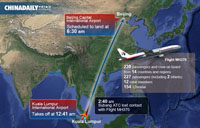Questions abound as the mystery deepens
Updated: 2014-03-11 09:42
(China Daily)
|
||||||||
Q+A

Praying for passengers of flight MH370

Why is it so difficult to locate the missing airplane?
Failure of the location equipment on the airplane may be the primary reason for the length of the search, some experienced pilots said.
The search range is too large, especially without any clue from the communication equipment on the flight, said Liang Shijie, chief pilot of the central and southern regional administration of Civil Aviation Administration of China.
Waves and winds on the sea also increase the difficulty of the search, since debris that could identify the aircraft's location might be dispersed or blown away, said Zhang Qihuai, vice-president of aviation law research for the China Law Society.
The lack of surface visibility at night may be another reason for the long search, Zhang said.
Insufficient rescue capabilities also could prolong the search, said some senior pilots in China.
Why were no signals detected from communication equipment?
Usually, some systems are equipped on an airplane to automatically send signals back to the ground when something is wrong with the plane, such as sudden changes in the plane's speed or dropping into water. The systems include an Aircraft Communications Addressing and Reporting System and an Emergency Locator Transmitter.
"Maybe some outside force destroyed the aircraft, and all the equipment including the antenna was damaged at the same time," said a captain from a domestic carrier with more than 10,000 flight hours.
There are other devices, like a transponder, that can send back signals, but they can be turned off or faulty avionics could stop them, he said.
What might have happened?
There are various guesses about the MH370, three days after its disappearance.
Some aviation industry insiders suspected a terrorist attack might have caused the airplane's disintegration.
But it is unusual in a terrorist attack that no one claims responsibility after three days. And no debris has been found.
Or the airplane could have encountered bad weather, said a captain with more than 100,000 flight hours, although satellite cloud images showed that the weather was fine at the time the aircraft vanished.
"It cannot be excluded that they met a single cloud on the route that was not detected by the satellite," he said.
Structural problems of the aircraft could be a possibility, too, because there are precedents of aircraft disintegration resulting from metal fatigue.
Why did it take so long for Malaysia Airlines to respond?
At 7:24 am on Saturday morning, Malaysia Airlines released the first media report that flight MH370 had lost contact with Subang air traffic control at 2:40 am and later changed that to 1:30 am. What they were doing during the six hours has been questioned.
The carrier did not give exact or full information, said Zhang, the China Law Society vice-president, adding that it should have released the latest information to the families and public in a timely manner.
But some pilots said there are strict processes for dealing with such an emergency.
Usually, air traffic control continues trying to contact the flight by radio and asks other flights in the air to attempt contact. After the airline is notified, it contacts every air traffic control site along the route in an attempt to trace the flight.
How do people using stolen passports get onto an aircraft?
Airlines cannot verify the authenticity of the buyer's information, especially when the ticket owner is of foreign nationality, said Dai Peng, director of the Criminal Investigation Department at People's Public Security University of China.
The airlines have no right to query the Interpol database. Some data may pertain to personal privacy, and there are certain use restrictions, he said.
Hong Daode, a criminal procedure law professor at China University of Political Science and Law, claimed there are serious loopholes in Malaysian airport and subway security checks.
He said Malaysian security authorities have not conducted any check through the Interpol passport database since the passports were stolen in 2012 and 2013 in Thailand, and this fact had already been registered in the Interpol database.
Reporting by Wang Wen, Zhang Yan and Zhang Lei.

 Fashions of the first ladies
Fashions of the first ladies
 Pro-Russian forces take over Ukraine's naval HQ
Pro-Russian forces take over Ukraine's naval HQ
 New US envoy hits ground running
New US envoy hits ground running
 HK cellist to perform at Carnegie Hall
HK cellist to perform at Carnegie Hall
 Skyscrapers in E China resemble LV check pattern
Skyscrapers in E China resemble LV check pattern
 President Xi honors memory of devoted county Party chief
President Xi honors memory of devoted county Party chief
 More than just food
More than just food
 Miss world visits cancer children in Colombia
Miss world visits cancer children in Colombia
Most Viewed
Editor's Picks

|

|

|

|

|

|
Today's Top News
Tour adds 'new dimension' to Sino-US ties
Hunger strike off, anger remains
China largest holder of US debt
California shelves proposal
Chinese treasures on the block
China must expand inbound tourism
Tourists offered compensation for bad air days
US first lady's China visit to boost relations
US Weekly

|

|







